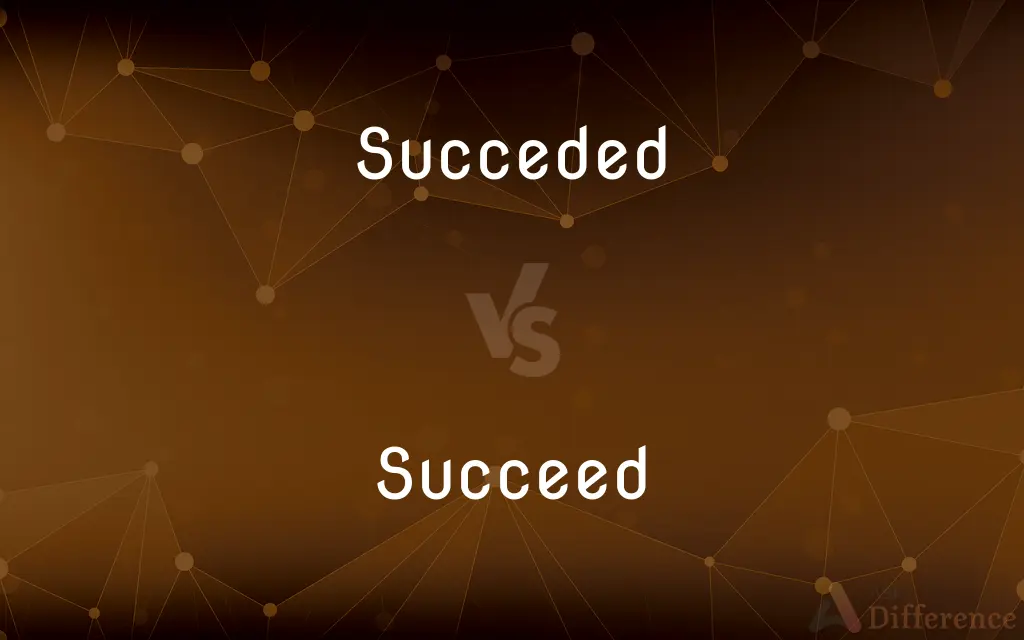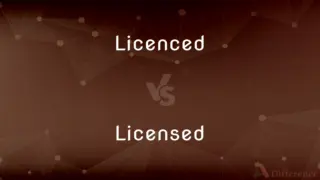Succeded vs. Succeed — Which is Correct Spelling?
Edited by Tayyaba Rehman — By Fiza Rafique — Updated on March 19, 2024
"Succeded" is an incorrect spelling, while "Succeed" is correct, referring to achieving a goal or attaining success.

Table of Contents
Which is correct: Succeded or Succeed
How to spell Succeed?

Succeded
Incorrect Spelling

Succeed
Correct Spelling
ADVERTISEMENT
Key Differences
You might visualize a “cc” motorbike speeding towards success to remember the double "c."
Lastly, the 'ee' might remind you of a cheer "wee!" for success, emphasizing excitement.
Consider "Succeed" as having double "c" for “continuous care” to achieve success.
Link "Succeed" with "Seed" – to grow success, you need a “seed” (pronounced similarly).
Recall that to succeed, efforts must “cede” or yield to your goal.
ADVERTISEMENT
How Do You Spell Succeed Correctly?
Incorrect: She is determined to succeded her career.
Correct: She is determined to succeed in her career.
Incorrect: He will succeded to finish the project on time.
Correct: He will succeed in finishing the project on time.
Incorrect: You must succeded your fear to achieve your goals.
Correct: You must overcome your fear to succeed in achieving your goals.
Incorrect: They hope to succeded the competition with their new product.
Correct: They hope to succeed in the competition with their new product.
Succeed Definitions
To succeed means to achieve a desired outcome.
He worked hard to succeed.
To succeed can mean to prosper or grow.
The crops will succeed in this weather.
Succeed can suggest winning in a challenge.
She will succeed in the competition.
Succeed can imply following next in order.
The prince will succeed to the throne.
To come next in time or order
She fell sick, and what succeeded was an outpouring of concern from her fans.
To replace another in office or position
The prince succeeded to the throne.
To accomplish something desired or intended
"Success is counted sweetest / By those who ne'er succeed" (Emily Dickinson).
(Obsolete) To pass to a person by way of inheritance.
To come after (something) in time or order; follow
Winter succeeds autumn.
To come after and take the place of
The heir succeeded the king.
(transitive) To follow something in sequence or time.
Autumn succeeds summer.
(transitive) To replace or supplant someone in order vis-à-vis an office, position, or title.
The king's eldest son succeeds his father on the throne.
After a contentious election, Jones succeeded Smith as president of the republic.
Take the place of
(intransitive) To come after or follow; to be subsequent or consequent; often with to.
(intransitive) To come in the place of another person, thing, or event; to come next in the usual, natural, or prescribed course of things; to follow; hence, to come next in the possession of anything; often with to.
Following the death of his mother, he succeeded to the throne.
So, if the issue of the elder son succeed before the younger, the crown (or: property) falls to me.
(intransitive) To ascend the throne after the removal or death of the occupant.
Princess Buttercup succeeded to the throne as queen after King Willoughby died.
(intransitive) To prevail in obtaining an intended objective or accomplishment; to prosper as a result or conclusion of a particular effort.
The persecution of any righteous practice has never succeeded in the face of history; in fact, it can expedite the collapse of the persecutory regime.
She succeeded in her efforts to repair the tank.
(intransitive) To prosper or attain success and beneficial results in general.
Voted most likely to succeed
To turn out, fare, do (well or ill).
(transitive) To support; to prosper; to promote or give success to.
(intransitive) To descend, as an estate or an heirloom, in the same family; to devolve; often with to.
To fall heir to; to inherit.
To go down or near with to.
To follow in order; to come next after; hence, to take the place of; as, the king's eldest son succeeds his father on the throne; autumn succeeds summer.
As he saw him nigh succeed.
To come after; to be subsequent or consequent to; to follow; to pursue.
Destructive effects . . . succeeded the curse.
To support; to prosper; to promote.
Succeed my wish and second my design.
To come in the place of another person, thing, or event; to come next in the usual, natural, or prescribed course of things; to follow; hence, to come next in the possession of anything; - often with to.
If the father left only daughters, they equally succeeded to him in copartnership.
Enjoy till I returnShort pleasures; for long woes are to succeed!
To ascend the throne after the removal the death of the occupant.
No woman shall succeed in Salique land.
To descend, as an estate or an heirloom, in the same family; to devolve.
To obtain the object desired; to accomplish what is attempted or intended; to have a prosperous issue or termination; to be successful; as, he succeeded in his plans; his plans succeeded.
It is almost impossible for poets to succeed without ambition.
Spenser endeavored it in Shepherd's Kalendar; but neither will it succeed in English.
To go under cover.
Will you to the cooler cave succeed!
Attain success or reach a desired goal;
The enterprise succeeded
We succeeded in getting tickets to the show
She struggled to overcome her handicap and won
Be the successor (of);
Carter followed Ford
Will Charles succeed to the throne?
Sometimes, to succeed implies proving effective.
The plan may succeed if implemented well.
Succeed Meaning in a Sentence
If you persevere, you will succeed.
With hard work, you can succeed in any field.
To succeed in this course, you'll need to study regularly.
He's trying hard to succeed in the competitive world of acting.
They implemented a strategy that ultimately helped them succeed.
Innovators are those who see opportunities where others see obstacles and succeed.
The project will only succeed if everyone contributes.
Only those who dare to fail greatly can ever succeed greatly.
The secret to succeed is to know something nobody else knows.
She believes that to succeed, one must never give up.
Persistence is key to succeed in any long-term goal.
You need both talent and determination to succeed.
To succeed in sales, you need excellent communication skills.
Succeed Idioms & Phrases
Succeed against all odds
To achieve success despite very low probability.
She managed to succeed against all odds and became the first in her family to graduate from college.
To succeed in spades
To achieve success to a very large extent or degree.
After years of hard work, her business finally succeeded in spades, earning her numerous awards.
Succeed come what may
To achieve success regardless of any obstacles.
He was determined to succeed come what may, never letting setbacks discourage him.
Succeed by leaps and bounds
To achieve rapid success in a short period.
The startup succeeded by leaps and bounds, expanding to international markets within a year.
Common Curiosities
What is the verb form of Succeed?
"Succeed" is itself a verb.
What is the singular form of Succeed?
Succeed is a verb and does not have a singular form.
What is the plural form of Succeed?
Verbs do not have a plural form.
Which vowel is used before Succeed?
"To" is often used before "Succeed."
Which article is used with Succeed?
Articles are not commonly used directly before the verb "Succeed."
Why is it called Succeed?
"Succeed" comes from Latin “succedere” meaning "come after, go near to."
Which conjunction is used with Succeed?
Any conjunction can be used, e.g., "and," "but," depending on sentence structure.
What is the pronunciation of Succeed?
Succeed is pronounced [suhk-SEED].
What is the root word of Succeed?
The root is the Latin word “succedere.”
Is Succeed a negative or positive word?
Succeed generally has a positive connotation.
What part of speech is Succeed?
Succeed is a verb.
What is the opposite of Succeed?
The opposite of Succeed is “fail.”
Which preposition is used with Succeed?
"In" is commonly used as in "succeed in."
Is Succeed a noun or adjective?
Succeed is a verb.
Is Succeed an abstract noun?
No, Succeed is not a noun.
Is the word “Succeed” a Direct object or an Indirect object?
Succeed is a verb and does not function as an object.
What is the first form of Succeed?
The first form is "Succeed."
Is Succeed a countable noun?
Succeed is not a noun and therefore not countable.
Which determiner is used with Succeed?
Determiners are not commonly used directly before verbs.
Is Succeed an adverb?
No, Succeed is a verb.
Is the Succeed term a metaphor?
Succeed is not a metaphor but can be used metaphorically in language.
Is the word Succeed a Gerund?
Succeeding would be the gerund form.
How do we divide Succeed into syllables?
Succeed is divided as suc-ceed.
What is a stressed syllable in Succeed?
The second syllable is stressed: suc-CEED.
What is the second form of Succeed?
The second form is "Succeeded."
What is the third form of Succeed?
The third form is also "Succeeded."
Is Succeed a vowel or consonant?
Succeed is a word, not a vowel or consonant.
Is Succeed a collective noun?
No, Succeed is not a noun.
Is the word Succeed imperative?
It can be, as in "Succeed at your goals!"
How many syllables are in Succeed?
Succeed has two syllables.
What is another term for Succeed?
Another term might be “prevail” or “triumph.”
How is Succeed used in a sentence?
"If you work diligently, you will succeed."
Share Your Discovery

Previous Comparison
Licenced vs. Licensed
Next Comparison
Friday vs. FrydayAuthor Spotlight
Written by
Fiza RafiqueFiza Rafique is a skilled content writer at AskDifference.com, where she meticulously refines and enhances written pieces. Drawing from her vast editorial expertise, Fiza ensures clarity, accuracy, and precision in every article. Passionate about language, she continually seeks to elevate the quality of content for readers worldwide.
Edited by
Tayyaba RehmanTayyaba Rehman is a distinguished writer, currently serving as a primary contributor to askdifference.com. As a researcher in semantics and etymology, Tayyaba's passion for the complexity of languages and their distinctions has found a perfect home on the platform. Tayyaba delves into the intricacies of language, distinguishing between commonly confused words and phrases, thereby providing clarity for readers worldwide.














































